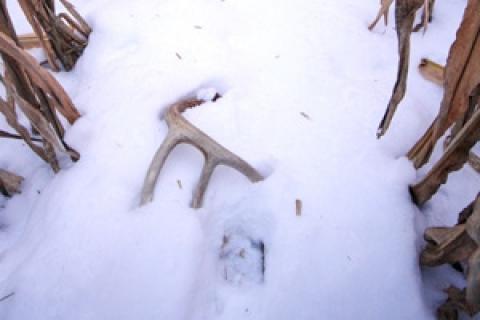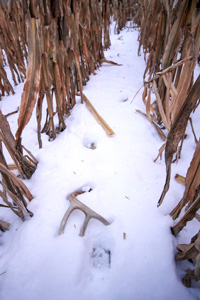
 When deer hunting season is about to wrap up, that signifies the beginning of my annual shed hunt. Word came through today that a big buck was spotted close to home sporting only one antler. They are beginning to drop. Here are some tips to help you find them.
When deer hunting season is about to wrap up, that signifies the beginning of my annual shed hunt. Word came through today that a big buck was spotted close to home sporting only one antler. They are beginning to drop. Here are some tips to help you find them.
- Search Where the Bucks Are. Seek areas that show obvious signs of bucks — scrapes and rubs from the fall. Place trail cams in likely spots, both to let you know that bucks are in the area and also to pinpoint the time of drops.
- Stick To Trails. Deer will utilize well-worn trails when moving from food source to bedding areas. These paths will cough up a large percentage of sheds.
- Search Deer Yards and Bedrooms. When snow cover is deep, deer will yard up and bed down under the thickest canopy of trees they can find. They will spend a large percentage of their time here over the winter. Many will drop their sheds in this prime location.
- Find Obstacles. The likelihood of an antler dropping when a deer jumps over an obstacle is significant. Look for fences, creeks, and fallen trees that are found along heavily traveled trails.
- Utilize Binoculars. I rely on binoculars to scan open fields. You will increase your finds by bringing a pair along, as well as save time and effort with false alerts from the naked eye.
- Get an Early Start. I prefer to start my shed hunt early in the season — just after Christmas here in South-Eastern Ontario. You may not find as many, but the drops will be fresh — and will be unmarked due to critters getting to them first.
- Bring a GPS. I like to track my movements by using a handheld GPS. This allows me to cover an area thoroughly, by making an easy-to-follow grid pattern. This will increase the effectiveness of your hunt greatly.
- Keep Looking. On average, I hike just over 6 miles for each shed antler I find. Shed hunting takes time and effort, but the rewards are well worth it. Never give up. That next pass you take along a tree line could cough up that bony treasure that will define your season.
- 5121 views

